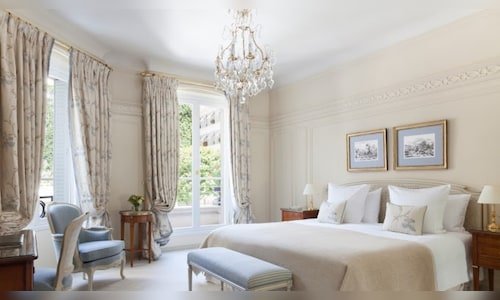Hotels & Accommodations
Over Ten Thousnads Hotels Join Landmark Lawsuit Against Booking.com Over Price Parity New Update You Need To Know

Wednesday, July 30, 2025
A mighty coalition of more than 10,000 hotels across Europe has joined forces against Booking in a show of unity. com in a class-action lawsuit. The lawsuit, which is being led by HOTREC, Booking. com’s barred price parity provisions, which have been ruled illegal by the Court of Justice of the European Union. The coordinated action, led by the Hotel Claims Alliance Foundation and backed by more than thirty national hotel associations, demands financial compensation for the unfair practices that the hotels have been subjected to for years. So while the summer season has been taking the time to catch back up, all hotels receive a fair opportunity at justice with this open extension.
The Emergence of a Collective Struggle
It is the first-of-its-kind suit taking a company like Booking to court, collectively, over a treatment that tech workers say has become standard in negotiations. com’s controversial rate parity agreements. More than 10,000 hotels from the continent — both large and small — have united to challenge the platform’s pricing policies. These parity clauses, which mandate that every platform should provide the same price, have been criticised by the industry for restricting hotel owners’ control over pricing strategy and raising costs in an already highly competitive market.
The lawsuit, which receives strong support by HOTREC and many hotel associations throughout Europe, seeks damages for hotels that fall victim to the practices of unfair provisions. That led to the European Court of Justice finding such parity clauses illegal (Case C-264/14), which in turn has led the hospitality sector coming together in this common aim.
A Stand Against Predatory Digital Market Practices
HOTREC President Alexandros Vassilikos highlighted the concerns of European hoteliers, who over the years, have faced what he referred to as “unfair conditions and excessive costs.” The class action filed yesterday by St. Louis attorney Matthew J. Eandi, sends a loud message to today’s digital marketplace; bad behavior will not be tolerated.
“We have seen years of hotel businesses held to ransom by these contracts, stifling competition and driving up prices,” Vassilikos added. The class action is a crucial attempt to stop these harmful practices and allow hotel operators to take back pricing freedom.
No risk hotel legal support
One of the key features of this class action is its risk profile for participating hotels. Legal expenses are being paid with the help of outside funding,so no hotel need be concern about the cost of defending this lawsuit. It enables small hotels, which might have otherwise been reluctant to sue, to join the fight for equity more easily.
The legal team is a mix of international lawyers whose aim is to get a great result for the Industry. With its support, hotels throughout the EU that have faced such pressures from Booking. com’s price parity provisions who are in a position to be paid back for the damage of the past.
Deadline Extended to Encourage Wide Spre
TO meet high demand and the summer’s busy season, HOTREC has extended the joining cutoff for hotels to the 29 of August, 2025. This offers everybody, including operators who are flat out during high season, a piece of the action. ‘We are pleased about the great response from the sector,’ said Marie Audren, Director General of HOTREC and added: ‘Thanks to the extension, there is a fair chance for all the hotels that meet the criteria to participate.
“The feedback from the industry has been overwhelmingly positive,” said Audren. “This longer schedule ensures that no hotel, no matter how busy, has its voice heard in this critical case.”
A Sign of Shift in the Digital World
This fight is about more than monetary payment: It is about establishing a precedent for fair business practices in the digital travel market. The result of this lawsuit could impact future negotiations between hotels and online travel agencies (OTAs), and help tip the scales in favor of hoteliers. If successful, the suit would create a more transparent and fair relationship between hotels and booking platforms, and be good for both sides.
The move also underscores the demand for greater regulation and scrutiny in the online travel business, which has boomed in recent years. In the era of the dominance of online booking channels in travel, practices like price parity need to be analyzed carefully — lest they invite exploitation.
What’s Next for the Lawsuit?
More than 1,000 hotels and legal experts supported the lawsuit against Booking. com, is expected to mark a major inflection point in the ongoing fight for transparency and fairness in online travel. While the legal proceedings unfold, the mass of hotels signed up proves the industry is united in its call for change. If the suit is successful, it could create a precedent that guarantees fair competition, more autonomy for hotel owners and a fairer deal for firms in the hospitality industry throughout Europe.
Hotels & Accommodations
Brigade Hotel expands footprint beyond South India, eyes religious tourism

Speaking to CNBC-TV18, Nirupa Shankar, Managing Director of Brigade Hotel Ventures, said that the company has an aggressive expansion pipeline, with five hotels already under development and more in the works.
The company is also shifting its portfolio mix toward high-end, five-star deluxe properties like Grand Hyatt (Chennai), Ritz-Carlton (Kerala), and Intercontinental (Hyderabad), which is expected to significantly boost ARR over the next five years.
While its base remains in South India, Brigade is gradually expanding into new geographies and exploring both leisure and religious tourism destinations. The firm is also scouting for opportunistic acquisitions using funds from its IPO proceeds, making it clear that its growth strategy is both long-term and diversified.
The company is optimistic about maintaining last year’s momentum in revenue and EBITDA, with 15–17% growth likely to continue in FY26.
These are edited excerpts of the interview.
Q: What is the growth outlook for the company in FY26 and FY27, and what kind of margins can we expect during this period?
A: In terms of our growth, what we have been saying is that last year, of course, now that we listed number of forward looking statements have to be limited. Last year we saw pretty good growth in terms of revenue and EBITDA. We saw a 16% to 17% growth in terms of topline and maybe another 15% in terms of EBITDA.
In the coming year, we feel that they should this year should not be any different. We feel very positive, I understand that the market is slightly volatile at the moment, and I feel that volatility is the nature of the game, and it is up to companies like us to keep our head down, work hard and stand the course and continue to deliver on good numbers.
Q: Given the pipeline that you have five new hotels that are coming in, your 1,000 keys coming in by FY28 to FY30, what is the peak revenue now that one could see coming in for the company? Overall in terms of the business wise FY25 ₹
468 crores was your revenue? Next three-four years, what would we expect?
A: The next three, four years, we will have three hotels coming in byFY28, we will have another three coming in and FY29 and the business development doesn’t stop just there. Every year we are doing business development continuously. In fact, apart from the five hotels where we have tied up the land and the brand, there are three more hotels where we have tied up the brand and the land, and that will be announced shortly.
In terms of the IPO proceeds, we have kept aside some funds to buy an unidentified asset, so it’s more of an opportunistic buy. There will be growth that we see over the next three years. Of course, with hotels, as you know, it does take time to develop, Greenfield assets can take once you finalise the design and once you finalise the land and get the approvals, they do take at least two and a half three years by the time they can open to the public. It is a long-term game when it comes to hospitality, peak revenues, like I said, by the time these hotels come up and start to stabilise, could take five years from now. Howevr, our existing portfolio will continue to see growth, and like I said, we are looking for opportunistic buys in the market as well to spur on our growth.
Q: Let us focus on geographical experience, as of now, you have a stronghold in South India. How do you see geographic breakup move from here on.
A: See our stronghold, even from the parent company, is the Southern markets. We like the markets of Bangalore, Chennai, Hyderabad. Our hotels are currently in five cities. We will be expanding to at least seven cities where we have current visibility and where we have acquired land. In the sense, expand from five to seven. Apart from that, one of the main reasons we did this IPO and sort of created our own entity for the hospitality vertical was so that we could look at markets where the parent entity doesn’t always already exist.
It could be some leisure destinations, some of the leisure destinations we are looking at could be Goa or interesting leisure destinations in the southern markets within driving distance of the major tier one cities could be religious destinations, where we can expect religious tourism to come through. We are evaluating markets apart from Southern. In India as well. But of course, a lot of the expansion will be in areas where we have a stronghold and where we understand the micro market specifically.
The portfolio will move from mostly business driven hotels to a very healthy mix of business and leisure. The other change that you can expect to see is moving more towards Five-star Deluxe hotels. We have signed up the Grand Hyatt in Chennai. It is a beachfront resort. We have signed up a Ritz-Carlton in Vaikom, Kerala, it’s an island beachfront resort. We have also signed up the Intercontinental Hotel in Hyderabad so these are all Five-star Deluxe properties. This will help increase the average room rate (ARR) of the portfolio when they come up and this will move us into more of Five-star luxury Deluxe category portfolio,
Q: Just a quick one in terms of ARR, what would your guidance be for the ARR going forward?
A: ARR for the existing portfolio is very different. But maybe, when we look at the ARR for the existing portfolio, because these are mostly stabilised hotels, then typically you don’t want to take a very high estimate. So our estimates are very conservative for the existing portfolio, could be in 9 to 10%.
But when you look at the portfolio overall and where we expect the portfolio to be four to five years when the new hotels come up, will be a significant increase. It could even mean a doubling up of the ARR based on how these hotels open and what the market conditions are at that point in time. Like I said, we are moving to lot more luxury hotels, and we do expect a significant increase in the ARR.
Hotels & Accommodations
15,052 Shares in Intercontinental Hotels Group (NYSE:IHG) Acquired by XTX Topco Ltd – MarketBeat
Hotels & Accommodations
Hospitality & Hotel Business Stock Price Jumps to Record High After 146% Revenue Jump and 235% Profit Growth in Q1FY26

On a year-to-date basis, the stock has risen by 0.66 per cent, while the three-month return stands at 24.81 per cent.
Chalet Hotels Limited witnessed a sharp rally in its share price on August 1, 2025, following the release of its robust Q1FY26 financial results. The stock surged nearly 19 per cent during early trade, touching an all-time high of Rs 1,082. This marked the company’s highest intraday gain in the past two months. By 10:57 am IST, the share price was trading at Rs 978.85, up 7.58 per cent.
The significant stock price movement was supported by Chalet Hotels’ strong operational performance in the June 2025 quarter. The company reported a 146 per cent year-on-year rise in total revenue to Rs 908.3 crore. Profit After Tax (PAT) jumped 235 per cent to Rs 203.1 crore, while EBITDA increased 150 per cent to Rs 371.1 crore.
DSIJ’s ‘multibagger Pick’ service recommends well researched multibagger stocks with High Returns potential. If this interests you, download the service details here.
Core business revenue (excluding residential operations) stood at Rs 470 crore, up 27 per cent year-on-year. Core EBITDA grew 37 per cent to Rs 210 crore, with margins expanding to 44.4 per cent. The company also achieved a 7 per cent increase in room inventory, driven by its expansion strategy. Chalet handed over 95 flats at its residential project in Koramangala, Bengaluru, further boosting revenue.
DSIJ’s ‘Multibagger Pick’ service recommends well researched multibagger stocks with High Returns potential. If this interests you, download the service details here.
In the hospitality segment, despite a decline in occupancy from 70 per cent to 66 per cent, the Average Room Rate (ARR) increased by 17 per cent to Rs 12,207. Revenue from this segment rose by 18 per cent to Rs 385.6 crore, with EBITDA rising 20 per cent to Rs 160.8 crore. RevPAR stood at Rs 8,059, up 10 per cent.
The rental and annuity segment posted strong growth, with revenue rising 106 per cent to Rs 73.2 crore and EBITDA jumping 130 per cent to Rs 60.8 crore. EBITDA margins improved significantly to 83.1 per cent.
The residential segment reported revenue of Rs 439.1 crore and EBITDA of Rs 162.8 crore, resulting in an EBITDA margin of 37.1 per cent.
The company was also recognised as a Great Place To Work® in India for the sixth consecutive time. However, a one-time reversal of deferred tax assets worth Rs 202.17 crore in Q2FY25, due to changes introduced by the Finance (No. 2) Act, 2024, had previously impacted the company’s profitability.
Despite being a Mid-Cap hospitality stock, Chalet Hotels has demonstrated consistent Quarterly Results and may attract attention from investors looking for long-term compounding or potential multibagger opportunities in the travel and real estate segments.
On a year-to-date basis, the stock has risen by 0.66 per cent, while the three-month return stands at 24.81 per cent.
Disclaimer: The article is for informational purposes only and not investment advice.
-

 Brand Stories2 weeks ago
Brand Stories2 weeks agoBloom Hotels: A Modern Vision of Hospitality Redefining Travel
-

 Brand Stories1 week ago
Brand Stories1 week agoCheQin.ai sets a new standard for hotel booking with its AI capabilities: empowering travellers to bargain, choose the best, and book with clarity.
-

 Destinations & Things To Do2 weeks ago
Destinations & Things To Do2 weeks agoUntouched Destinations: Stunning Hidden Gems You Must Visit
-

 Destinations & Things To Do1 week ago
Destinations & Things To Do1 week agoThis Hidden Beach in India Glows at Night-But Only in One Secret Season
-

 AI in Travel2 weeks ago
AI in Travel2 weeks agoAI Travel Revolution: Must-Have Guide to the Best Experience
-

 Brand Stories4 weeks ago
Brand Stories4 weeks agoVoice AI Startup ElevenLabs Plans to Add Hubs Around the World
-

 Brand Stories3 weeks ago
Brand Stories3 weeks agoHow Elon Musk’s rogue Grok chatbot became a cautionary AI tale
-

 Asia Travel Pulse4 weeks ago
Asia Travel Pulse4 weeks agoLooking For Adventure In Asia? Here Are 7 Epic Destinations You Need To Experience At Least Once – Zee News
-

 AI in Travel4 weeks ago
AI in Travel4 weeks ago‘Will AI take my job?’ A trip to a Beijing fortune-telling bar to see what lies ahead | China
-

 Brand Stories4 weeks ago
Brand Stories4 weeks agoChatGPT — the last of the great romantics














You must be logged in to post a comment Login